News
STA, 3 December 2019 - The three-member presidency of Bosnia-Herzegovina will pay an official visit to Slovenia on Wednesday and Thursday for talks with their host President Borut Pahor and the country's other top officials.
Chairman Željko Komšić and presidency members Šefik Džaferović and Milorad Dodik are visiting after being elected just over a year ago. The previous presidency visited Slovenia in March 2015.
Pahor's office sees the visit as a continuation of regular bilateral meetings at the highest political level, and an opportunity to reaffirm the traditional friendship between the two countries.
Pahor will receive the presidency with a guard of honour, after which the trio will lay a wreath at the Memorial to Victims of All Wars and open a Bench of Friendship with Pahor in Congress Square.
Po uradnem sprejemu z vojaškimi častmi so predsedujoči ter člana Predsedstva Bosne in Hercegovine položili venec k Spomeniku vsem žrtvam vojn in z vojnami povezanim žrtvam. pic.twitter.com/hFOq5gItxl
— Borut Pahor (@BorutPahor) December 4, 2019
Ob uradnem obisku Predsedstva Bosne in Hercegovine v Sloveniji so predsednik Republike Slovenije in predsedujoči ter člana Predsedstva Bosne in Hercegovine odkrili Klopco prijateljstva na Kongresnem trgu. pic.twitter.com/qB5mfoCvMm
— Borut Pahor (@BorutPahor) December 4, 2019
After talks at the Presidential Palace, the presidency will also meet National Assembly Speaker Dejan Židan and then Foreign Minister Miro Cerar.
On Wednesday, the presidency will also visit an exhibition that looks backs at the 20 years of demining efforts by the Slovenian-run ITF fund in Bosnia and Herzegovina.
A meeting with Prime Minister Marjan Šarec is scheduled for Thursday when the presidency and Pahor are also due to take part in an academic debate on constitutional issues in Bosnia-Herzegovina.
The visit is expected to focus on a variety of topics, including ways to develop bilateral relations and economic cooperation, regional and multilateral cooperation and the implementation of the 2001 Yugoslavia succession treaty.
Bosnia-Herzegovina's reform process and its aspirations to join the EU are also expected to rank prominently, along with topical political and economic situation in the country.
Migration will be another major topic, in particular considering that between 6,000 and 8,000 migrants are estimated to be stranded in Bosnia-Herzegovina, most of them in the north-west of the country.
Due to a lack of accommodation facilities almost half of the migrants are roughing it out in the open or in abandoned buildings, which has been causing discontent among the migrants and the local population.
About 3,300 migrants are accommodated in five EU-funded temporary reception centres. The centre in Bihać is overcrowded and so is the nearby Vučjak refugee camp where migrants live in appalling conditions.
The European Parliament and the former European Commissioner for Migration and Home Affairs Dimitris Avramopoulos have called on the Bosnian authorities to move the migrants into appropriate reception centres to prevent a humanitarian disaster in the winter.
Bosnia-Herzegovina is also grappling with economic difficulties and high unemployment. The country has been trying to make headway in the process to join the EU and NATO.
The country submitted an application for EU membership three years ago, but the European Commission has merely issued an opinion on its application without giving it candidate status or making any recommendations to member states on the future course of action.
The biggest obstacle to membership of NATO, apart from meeting the alliance's requirements, is the opposition by the Serb entity and the Serbian member of the presidency Dodik, the former long-serving president of Republika Srpska.
Slovenia has been vocally supporting Bosnia-Herzegovina's aspirations to join the EU and NATO and the countries have good political and economic relations.
Bilateral merchandise trade rose to a record EUR 1.34 billion last year, amounting to nearly EUR 881 million in the first eight months of this year, Slovenia's exports accounting for EUR 521 million.
Slovenia is also a major investor in Bosnia-Herzegovina with more than a hundred companies there in majority Slovenian ownership.
Along with other successors to the former Yugoslavia, the countries are also engaged in the implementation of the succession agreement. Slovenia would like talks to start on division of the former federation's guarantees for the savings deposits.
Pahor met the new presidency in the Bosnian capital on 17 April when he attended the Sarajevo Business Forum at their invitation.
Miro Cerar made an official visit to Bosnia-Herzegovina in April 2017 as the first Slovenian prime minister since 2010.
The last Bosnian official to visit Slovenia was Foreign Minister Igor Crnadak in April 2018, while senior officials from the two countries meet regularly on the sidelines of multilateral meetings.
STA, 3 December 2019 - Three Slovenian projects developing research infrastructure for international competitiveness of Slovenia have won a total of EUR 8.4 million in subsidies from EU funds. The projects are related to the priority areas of the research infrastructure development of the national smart specialisation strategy.
LifeWatch, a EUR 3.3 million project intended for the purchase of equipment which will enable international research projects for monitoring and projecting the effects of global changes on biodiversity to be continued, will get EUR 2.6 million from the European Regional Development Fund.
The research infrastructure will enable the collection, processing and storage of data on biodiversity, the Government Office for Development and European Cohesion Policy said in a press release on Tuesday.
A bank of tissue samples, an analytical centre and a molecular laboratory with software for analysis of genetic diversity and genomics and biotechnology instruments will also be established as part of the project.
Eatris, a EUR 2.4 million project aimed at modernising research infrastructure serving for early phases of development of pharmaceuticals and development of the latest diagnostic methods and therapeutic approaches, will get EUR 1.6 million in EU funds.
The projects includes genome and metabolome technologies which are, due to their application-oriented nature, also called translational research. This will improve Slovenia's competitiveness as part of the European Research Area and European research infrastructures.
Also receiving EUR 4.2 million from the European Regional Development Fund is Elixir, a EUR 5.3 million project intended for boosting the national research capacity in life sciences. It will provide infrastructure for a more efficient transfer of new knowledge to healthcare and industries related to biological processes.
The infrastructure enables effective integration of consortium partners with related partners in other national infrastructures in natural sciences, life sciences and advanced computer technologies, the government office said.
STA, 3 December 2019 - The central bank has warned that there are "substantial downside risks" in budgetary plans for 2020 and 2021 that the National Assembly confirmed in a revote this week.
The risks "stem from a possible acceleration of the slowing of economic growth," Banka Slovenije said in a report on macroeconomic trends released on Tuesday. "There are few signs of faster growth towards the end of the year."
For 2020 budget expenditure is capped at EUR 10.36 billion and revenue at EUR 10.77 billion, making for a surplus of EUR 415 million. In 2021 expenditure will rise to EUR 10.45 billion and revenue is projected to climb to EUR 11.1 billion, with the surplus swelling to EUR 657 million.
While the budgets were slightly corrected after the government's forecaster, IMAD, revised its growth projections downward, they still project the highest outlays the government has ever had at its disposal, as revenue in recent years has been buoyed by brisk economic activity and employment growth.
But much like the Fiscal Council, the fiscal policy watchdog, the central bank warns that export growth is slowing due to uncertainty over global trade, while construction, another engine of growth, is weakening.
At the same time, business and consumer sentiment are deteriorating, and even though employment growth remains robust, underpinning strong domestic spending, figures from the construction sector indicate employment growth may be stalling.
Check the date at the top of the page, and you can find all the "morning headlines" stories here. You can also follow us on Facebook and get all the news in your feed.
A schedule of all the main events involving Slovenia this week can be found here
This summary is provided by the STA:
Cerar and Vučić talk EU enlargement, business links
BELGRADE, Serbia - Foreign Minister Miro Cerar continued his official visit to Serbia by meeting President Aleksandar Vučić, who hailed Slovenia's active engagement in the Western Balkan Region. The pair discussed bilateral economic cooperation, succession to the former Yugoslavia and Slovenia's support for EU enlargement. "Our shared interest is a stable situation in the region," Cerar said on Twitter after the meeting, noting Serbia's "active role in regional integration".
Slovenia, EU Commission present their arguments in Teran case
LUXEMBOURG, Luxembourg - Slovenia, the European Commission and Croatia presented to the General Court of the European Union their arguments in a case related to a derogation enabling Croatia to use Teran as the name of a red wine protected by Slovenia, with unofficial sources suggesting that it would be thankless to project the content of the ruling. No side gave official statements to the press after the three-hour session in Luxembourg, and the next step, a ruling, is expected to be made by the end of next year.
Parliamentary inquiry wants two Constitutional Court judges prosecuted
LJUBLJANA - A parliamentary inquiry commission whose work has been thwarted by the Constitutional Court plans to file a criminal complaint against two judges at the court that it says acted unlawfully and arbitrarily. The commission inquiring into the prosecution of former Maribor Mayor Franc Kangler plans to charge court president Rajko Knez and judge Matej Accetto under article 288 of the criminal code, which stipulates that judges may be sent to prison for up to three years for willingly bending the law to damage a party or basing their reasoning on evidence they know is non-existent or false.
Slovenian 15-year-olds above OECD average in literacy
LJUBLJANA - The results of Slovenian 15-year-olds in reading, scientific and mathematical literacy tests are above the OECD average, shows the recent PISA study. Compared to the previous such study, the students have come off as less accomplished in reading and science literacy though. The results of the study, which was conducted last year among some 6,400 15-year-olds, mostly secondary school first year students, have confirmed that Slovenian students of this age group excel in mathematical literacy.
Turkish bidder on track to win Karavanke contract
LJUBLJANA - Turkish builder Cengiz has announced it has won the contract to build the Slovenian section of the second tube of the Karavanke motorway tunnel, as the motorway company concluded talks with three bidders. The statement was made by Mohamed Cengiz, the main negotiator for the Turkish company, after the end of the talks. He said they were waiting to start working with Slovenian subcontractors as soon as possible. Unofficially, the talks ended after the first round today, but DARS is yet to announce its final decision, when it also reveals the latest offers made by the three bidders.
Central bank sees "substantial downside risks" in budget plans
LJUBLJANA - The central bank has warned that there are "substantial downside risks" in budgetary plans for 2020 and 2021 that the National Assembly confirmed in a revote this week. The risks "stem from a possible acceleration of the slowing of economic growth," Banka Slovenije said in a report on macroeconomic trends. "There are few signs of faster growth towards the end of the year."
Medved calls for further development of single digital market
BRUSSELS, Belgium - Public Administration Minister Rudi Medved met with his EU counterparts in charge of telecommunications to discuss ethical aspects of key importance for data economy to succeed. The minister called for further development of the single digital market, as Slovenia has a very good experience in the field of open data.
Telekom Slovenije becomes sole owner of Planet TV
LJUBLJANA - The Slovenian telecoms incumbent Telekom Slovenije has become the sole owner of Planet TV, the company running the namesake TV station, after paying out its Greek partner in the venture in compliance with a court decision. With the transfer of the Greek partner's 34% share in the joint venture Antenna TV SL, Telekom changed the company's name from Antena TV SL to Planet TV.
Employers upbeat about employment growth in first half of 2020
LJUBLJANA - Despite figures showing economic growth slowing down, Slovenian employers remain optimistic for the first half of next year. Indeed, they expect labour shortages on average rather than having to lay off workers, showed a survey by the Employment Service. The total number of persons in employment is projected to grow by about 2%, as employers expect to hire almost 32,000 persons, of which 13,500 will be for newly created jobs and the rest to replace retiring workers.
Slovenians in Austria congratulate new Gurk-Klagenfurt bishop
KLAGENFURT - NSKS, an umbrella organisation of the Slovenian minority in Austria, congratulated ethnic Slovenian Jože Marketz on being officially appointed the new bishop of the Roman Catholic Diocese of Gurk-Klagenfurt. "The joy in the ethnic community is great and honest." "When the ethnic community almost gave up on this great wish, the Holy Father, Pope Francis decided otherwise, the organisation said. Congratulations also same from the Council of Slovenian Organisations (SSO), an umbrella organisation of Slovenians in Italy.
Six persons injured in gas blast
KRANJ - Six persons were injured, including four children, and 76 persons had to be temporarily evacuated following a gas explosion close to a local road in Britof, north-east of Kranj. The explosion occurred in a manhole, injuring two persons who were performing works there and four children who happened to be nearby. All six have received medical care but the extent of their injuries remains unclear for now. Local residents were allowed to return to their homes after a few hours.
University of Ljubljana celebrates centenary
LJUBLJANA - The University of Ljubljana, Slovenia's largest institution of higher learning, is celebrating its centenary with a series of events that culminated on the day exactly 100 years ago when the first lecture was delivered in the Slovenian language. The university awarded out a doctorate to Kenneth Brian Frampton of Columbia University in New York and held a special ceremony at which it received the Order of Merit for Distinguished Service from President Borut Pahor.
Play on female sexuality to jazz up Ljubljana theatre scene
LJUBLJANA - A play titled this apple, made of gold by acclaimed playwright Simona Semenič is to premiere at the Ljubljana Cankarjev Dom arts centre on Thursday. The play, introducing a new genre into the Slovenian theatre arena, erotic drama, focuses on three women at various stages of life and their sexual desires. Semenič, an award-winning artist, has been nominated for the Grum Prize, the top national accolade for playwriting, for this particular play.
Visiting Ljubljana? Check out what's on this week, while all our stories on Slovenia, from newest to oldest, are here
If you're learning Slovenian then you can find all our dual texts here
In Slovenia there is a strange phenomenon of three incarnations of a bearded old man that brings gifts to children in December. This could have happened either due to the balance of power among the competing ideologies in recent political history, or it could also be a successful plot of several generations of kids making their parents feel guilty about politicising such a wonderful kids’ holiday, which all three of the events are supposed to be.
The first one of the three is the most religiously traditional and often very disciplinary figure of St. Nicholas (Miklavž, or Sveti Miklavž), who arrives on December 5th, with Santa Claus (Božiček), a liberal import from the West and Grandpa Frost (Dedek Mraz), a leftist revolutionary figure imported from the East, following suit later in the month.
Processions are usually organised mostly for Miklavž and Dedek Mraz, and while the timing of Miklavž is always set for December 5 for both gift giving and appearances, Dedek Mraz can be seen throughout the month, although he brings gifts to kids’ homes on the New Year’s Eve alone. Of course there is also Santa Clause, bringing gifts on Christmas Eve, but this old man can mostly be seen in shopping malls.
Miklavž (or St Nicholas) is an early Christian saint and bishop from Mira (then part of the Roman Empire, today Turkey), known for his generosity. As a gift giver he is especially popular in Central Europe, where many churches are named after him, including the Ljubljana Cathedral (St. Nicholas Church).
As a gift giver Miklavž, being a saint, descends from heaven – in the case of Ljubljana that means coming down Castle Hill in the funicular – with a group of angels and devils, the former giving sweets to good children, the latter scaring them with chains and canes so that they wouldn’t be bad, along with some other interesting characters.
Miklavž can be met this Thursday, December 5, 2019 in the following places:
LJUBLJANA: Starting at 17:00 at Krekov trg, from there to Ciril Metodov trg, Stritarjeva ulica, and Prešernov trg
MARIBOR: Starting at 17:00 at Grajski trg
KRANJ: Starting at 17:00 at Glavni trg
DOMŽALE: Starting at 17:00 at Športna dvorana (sports hall) Domžale
CELJE: Starting at 17:00 at Krekov trg
KAMNIK: Starting at 18:00 at Glavni trg, in case of bad weather at Dom kulture
VRHNIKA: Starting at 17:00 in front of Ivan Cankar birth house, then group walk with torches to Sveta trojica
ŠKOFJA LOKA: Starting at 16:50 at Mestni trg/Loški oder
DOVJE: At 16:00 in Aljažev prosvetni dom
STA, 3 December 2019 - The University of Ljubljana, Slovenia's largest institution of higher learning, is celebrating its centenary with a series of events that culminated on Tuesday, the day exactly 100 years ago when the first lecture was delivered in the Slovenian language.
The university awarded out a doctorate to Kenneth Brian Frampton of Columbia University in New York today and will hold a special ceremony in the evening when it will receive the Order of Merit for Distinguished Service from President Borut Pahor.
The university started out with five founding members - the faculties of arts, medicine, law, technology and theology - after King Alexander signed a law establishing what was then the University of the Kingdom of Serbs, Croats and Slovenes in Ljubljana.
The first lecture was delivered in the building that remains the seat of the university to this day, the former Carniolan Provincial Court in the centre of Ljubljana, by the linguist Franc Ramovš and the topic was the historical grammar of the Slovenian language.
In the first academic year the university boasted almost a thousand students and by the start of the Second World War enrolment had increased to almost 2,500.
While male students far outnumbered women in the first years, the first person ever to get a doctorate was a woman, Ana Mayer, who received her PhD in chemistry in July 1920.
The university continued to grow after the Second World War and by the 1960s it already had nine faculties. In 1979 it was renamed to Edvard Kardelj University, in honour of the Slovenian Communist ideologue, but in 1990 it reverted to the University of Ljubljana.
After independence, especially under the 1993 higher education act, it transformed into what it describes as a "classical European university," with greater emphasis on scientific research and greater autonomy.
It presently comprises 26 faculties and academies and its 38,000-plus students are enrolled in 158 bachelors', 196 masters' and 21 doctoral programmes ranging from the arts to social sciences, natural sciences, engineering, medicine and law.
"A hundred years later we are a university that has gone beyond national borders and helps build the European university of the future," Chancellor Igor Papič told the STA.
He said the University of Ljubljana ranks among the top three percent of universities in the world, which was "probably unimaginable a century ago, when we were fighting to get the university in the first place and faced constant pressure that it be shut down."
In the latest Shanghai Rankings, considered a benchmark for higher education institutions, the university ranks 501-600, down from 401-500 last year.
At the ceremony today Papič said that the university was "in excellent shape". While it wants better financing, it is glad it does not currently have problems paying salaries. The main challenge at the moment is securing funds for the construction of several new faculty buildings and cutting-edge research equipment.
STA, 3 December 2019 - Six persons were injured, including four children, and 76 persons had to be evacuated following a gas explosion which took place close to a local road in Britof, north-east of Kranj on Tuesday afternoon.
The explosion occurred around 3pm in a sewage shaft, injuring two persons who were performing works there and four children who happened to be nearby, the Kranj Police Department said.
All six have received medical care, with the trauma specialist on duty at the UKC Ljubljana hospital telling the press that no one's life was in danger. One of the children has already been released.
A total of 76 persons from twenty nearby homes had to be evacuated and the road closed for traffic, but residents were allowed to return to their homes around 7pm.
According to the police, the explosion was caused by gas, which is suggested by measurements made by the firefighers at the scene.
The local gas pipeline, which runs close to the shaft where workers were doing works, has been closed.
Slovenian gastronomy is having a moment, although – in all truth – this moment has been going on for some time and the attention is only going to increase in the years ahead. Let’s date the start of this to Ana Roš (of Hiša Franko) being the focus of one episode of Netflix Chef’s Table in 2016, alongside such names as Massimo Bottura, Grant Achatz, Alex Atala, Albert Adrià, Christina Tosi and Magnus Nilsson. Or perhaps to 2017, when she was declared The Best Female Chef in the World.

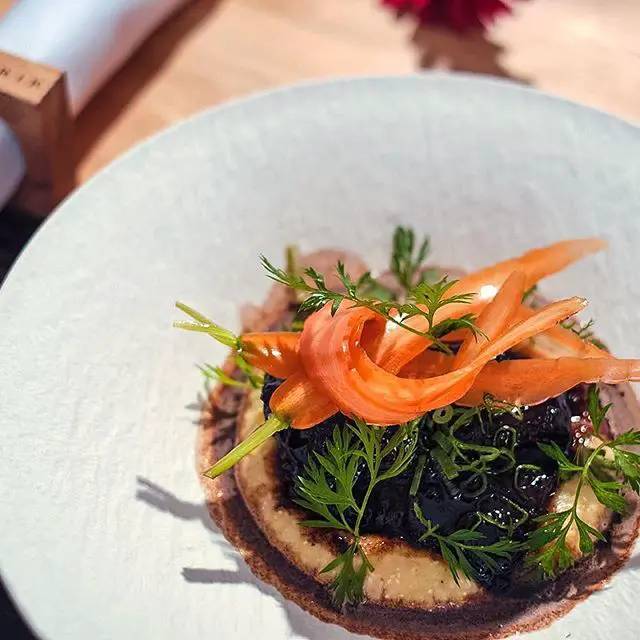
Then in 2018 there was the naming of Slovenia as a European Region of Gastronomy for 2021, which only stepped up the official promotional efforts (like last month’s November Gourmet in Ljubljana) and international attention, with Gault&Millau launching their Slovenian guide in 2018, and Michelin inspectors currently filing their reports. So it’s a good time to get into Slovenian food (and wine and beer) and learn more about what’s making it a must-visit destination among the world’s gourmets, gourmands and foodies.

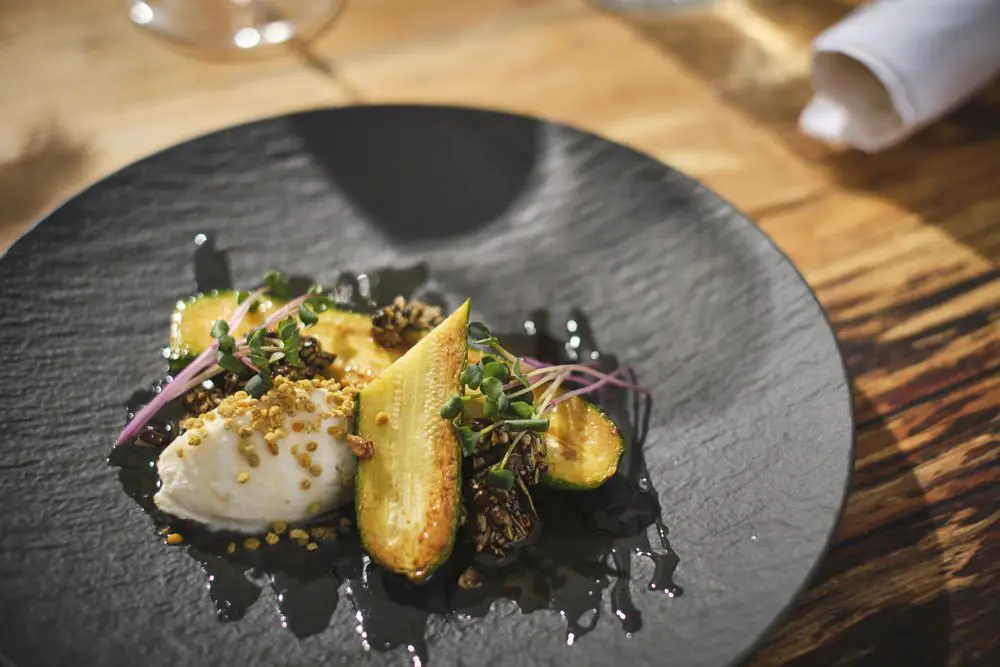
One place you can do this is at Landerik, in Ljubljana’s Old Town, where the young chef is Izidor Kržišnik, a protégé of Igor Jagodic, the acclaimed head chef of Strelec, one of only six restaurants in the country that received a full four toques from Gault&Millau. And that’s not all, as Kržišnik also did time in the kitchen of Mirazur, the French restaurant with three Michelin stars that was named the world’s best earlier this year.

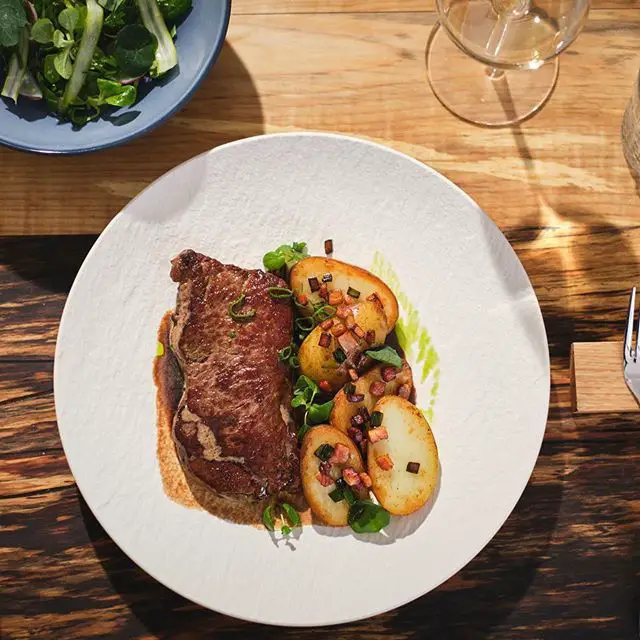
At Landerik Kržišnik and his team apply the lessons learned from these temples to gastronomy, while offering a less formal experience in a more relaxed setting. Here you’ll find traditional ingredients – with pretty much everything but the sugar locally sourced – and traditional forms, but not necessarily the standard ingredients in the standard forms. So yes, there’s a klobasa, but it’s made of brancin (sea bass).
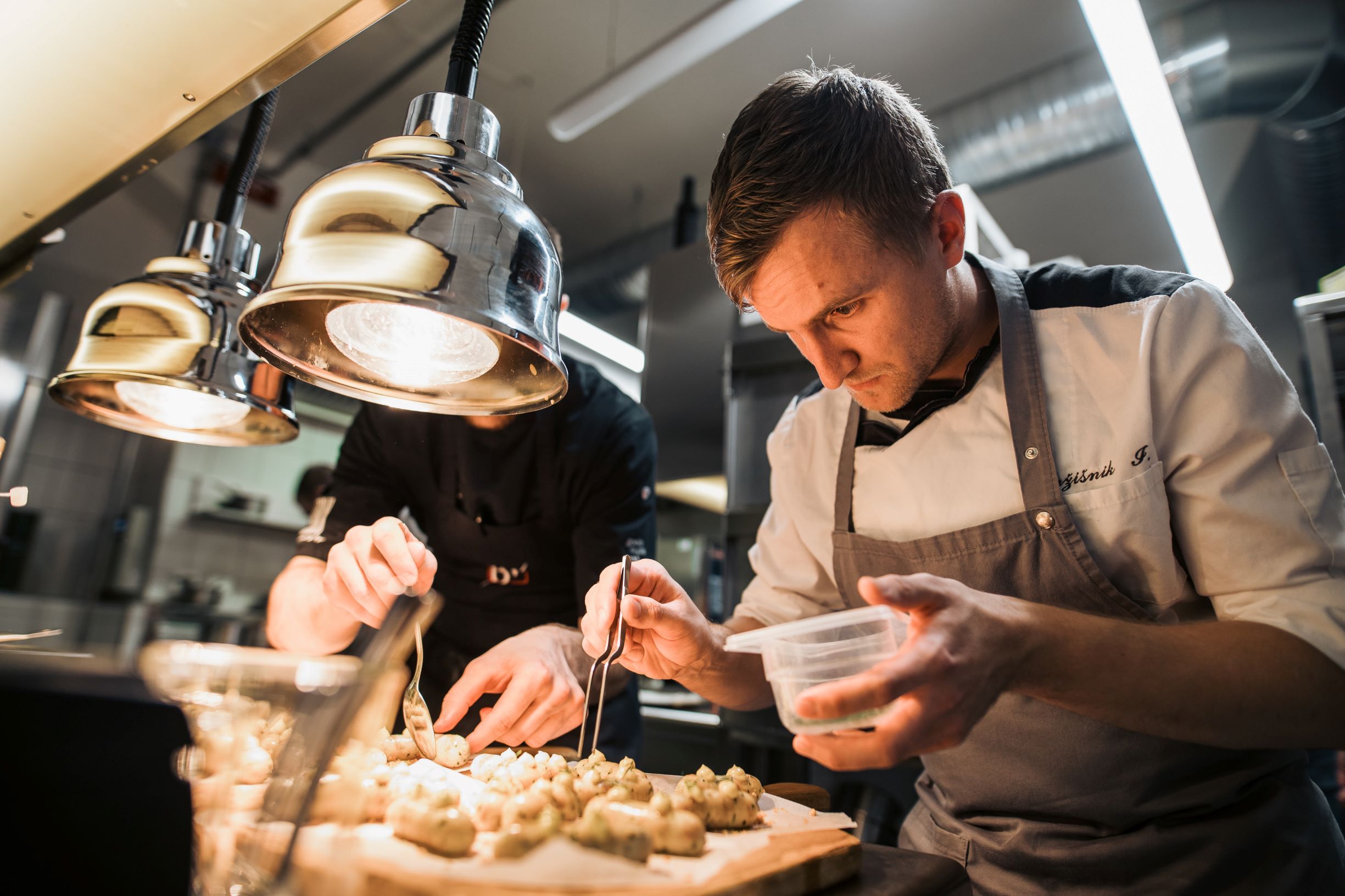
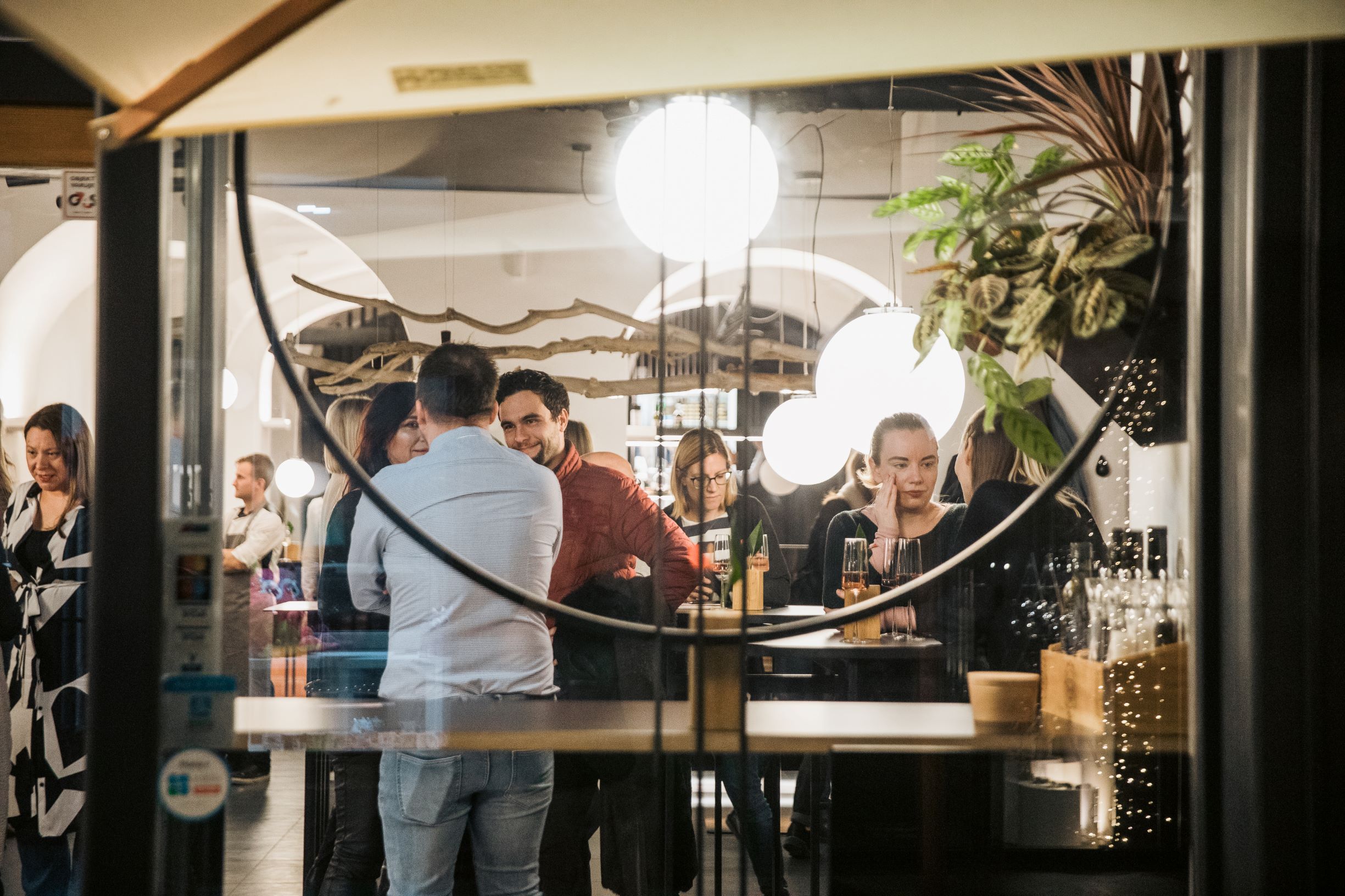
That said, the place stays close to the classics in many respects, such as the signature dish of beef cheeks, corn polenta, carrot salad with horseradish, or the ravioli with Tolmin cheese, or veal liver, potato puree with brown butter, roasted onion and fried onion, or šmorn – a classic dessert that’s a fluffy, shredded pancake.

As noted above, everything is made with local ingredients, including the drinks, and the dishes on offer enable to go as deep as you want into Slovenian cuisine, and stray as far off the path of the usual as you’d like, with dishes that both the gourmet and casual diner can appreciate.
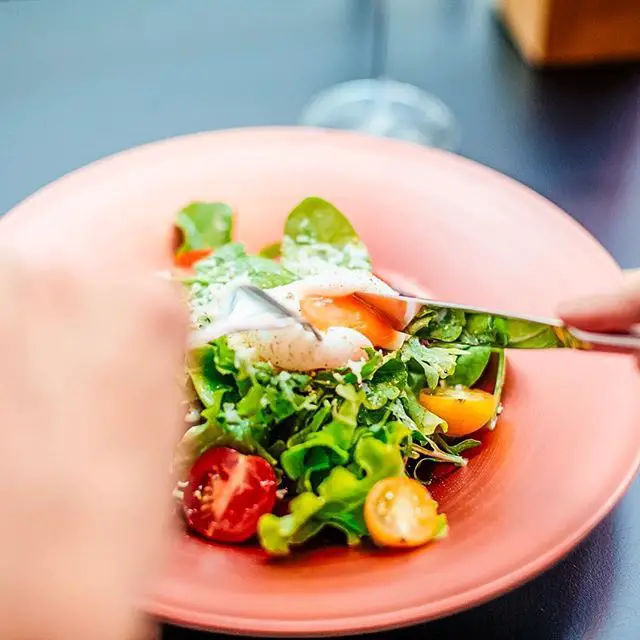

Landerik is open from 08:00 to 23:00 Monday to Thursday and Sunday, and until 00:00 on Fridays and Saturdays, and thus can be use for breakfast, brunch, lunch, dinner and supper, with both set and a la carte menus that are a joy to explore and can be found here. What’s more, the location at Stari trg 11, in the heart of the Old Town, is an experience itself, on a medieval street and a short walk to the river or up to the Castle on one of the more scenic and quieter paths that are hidden away here.
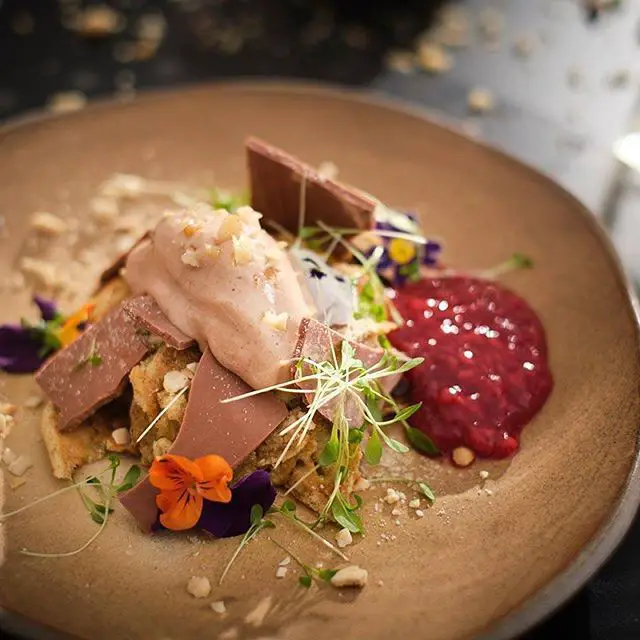
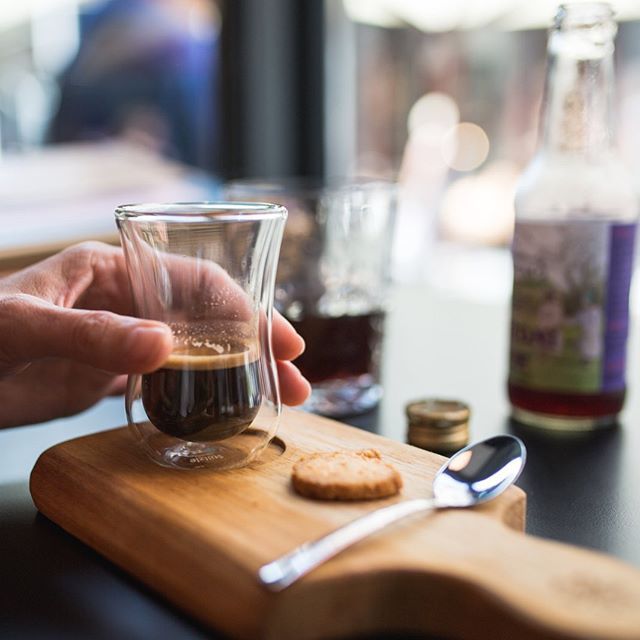
While a trip is recommended any time – I’ve been there twice and look forward to a third run – one date to mark is December 17, 2019. This is when Izidor Kržišnik’s mentor, Igor Jagodic, will come down from the Castle and enter the kitchen of Landerik. Here the two chefs and their team will prepare special six-course gourmet menu, for which reservations are already open (more details here). For Landerik in general, can book a table and take a look at the menu here.
STA, 3 December 2019 - The results of Slovenian 15-year-olds in reading, scientific and mathematical literacy tests are above the OECD average, shows the recent PISA study. Compared to the previous such study, the students have come off as less accomplished in reading and science literacy though.
The results of the study, which was conducted last year among some 6,400 15-year-olds, mostly secondary school first year students, have confirmed that Slovenian students of this age group excel in mathematical literacy.
Their scientific literacy is above the OECD average as well; however, the latest performance in this category shows a slight downturn - the same goes for the students' reading literacy, which significantly improved in 2015 compared to the PISA studies conducted in 2009 and 2012, but has now declined a bit.
Compared to the 2006 study, the first time such a study was conducted in Slovenia, the students' reading literacy in 2018 was pretty much the same, their mathematical literacy improved and scientific literacy slightly deteriorated, according to the Educational Research Institute, which carried out the Slovenian part of the study.
Last year's decline in reading literacy is a result of a worse performance across the spectrum, with the share of worst performers increasing by three percentage points to 18%.
Commenting on these developments, Education Minister Jernej Pikalo said that his ministry might have to discuss the efficiency of related measures from 2009.
Regarding scientific literacy, the average downturn resulted from a worse performance of the best performers, with their share dropping by four percentage points to 7%.
Meanwhile, girls achieved better results than boys in reading as well as scientific literacy last year - the former's performance was significantly better on average than in other OECD countries.
Slovenian students are also less motivated than their OECD peers worldwide - compared to 2009, the students' enjoyment experienced during reading in 2018 remained below the OECD average, with the students often expressing disappointment over the engagement and support of their teachers of the Slovenian language.
The minister is concerned over this lack of motivation, saying digital media were a distraction that pulls students away from books, while also highlighting that the signal regarding the teachers of Slovenian needs to be acknowledged.
The study also showed that the students spent an hour more on the internet in 2018 than in 2012 - altogether, more than three hours per day, which Pikalo thinks is another cause for concern.
The minister pointed out that the results did not necessarily always depict the actual situation in schools; however, he did acknowledge that Slovenia's educational system should cater better to gifted students.
He also highlighted that students needed to be able to not only understand texts but also to contextualise and use new information in the future.
All our stories about education in Slovenia are here
STA, 3 December 2019 - More than 300 events in galleries, museums, theatres and other cultural organisations around the country will be available free of charge for all age groups on Tuesday, 3 December, in memory of the birthday of Romantic poet France Prešeren (1800-1849).
The Merry Day of Culture, as the campaign is termed, is organised for the 20th year in a row, bringing exhibitions, theatrical shows, guided tours, workshops etc.
The campaign has been designed to reach out to those who rarely visit cultural organisations and events.
It has become very popular, and many museums and galleries have traditionally been the busiest venues on 3 December.
In Ljubljana, permanent and temporary exhibitions at all national museums and galleries will open the door to the public free of charge.
A number of events will be organised at Ljubljana Castle, the National and University Library, Cankarjev Dom and the Theatre Museum.
Novelties in the Fran web portal which features several dozen dictionaries and Slovenian language resources will also be presented to the public.
Given that 3 December falls on a weekday this year, groups organised by schools are expected to dominate among the visitors.
STA, 2 December 2019 - Opposition Democrat (SDS) leader Janez Janša expects "an early election sooner or later" because the government coalition is running out of "sweets" to distribute among voters, "which will cause big trouble".
If fragmented, minority governments do not last long, Janša said as he commenced on political developments on the sidelines of an event marking the 30th anniversary of the DEMOS government.
"The DEMOS coalition did also not last long once it became a minority government," Janša drew a parallel with the events from three decades ago.
The current coalition will "keep the government alive for a while longer, but all they can do is harm", said Janša, whose SDS won the 2018 election but was unable to form a government because practically all parties rejected working with it.
"It's been somehow OK as long as sweets were distributed and debts accumulated for future generations to pay. But this 'rope' is getting shorter, which will cause big trouble."
Nevertheless, Janša does not expect an early election "very soon", saying voters were tired of elections and parties financially drained.
He believes the most plausible option will be finding "a temporary solution", yet sooner or later there will be an early election.
Asked whether his party could be the temporary solution, Janša said "the SDS is never a temporary solution".
Asked whether he was in talks with the coalition Modern Centre Party (SMC) to possibly form a new government, he said that his party had always been "willing to talk with all those who are willing to talk".
Janša moreover believes Prime Minister Marjan Šarec should have called a session of the National Security Council to discuss the latest escalation of tensions between the SOVA intelligence agency and the parliamentary oversight commission, as suggested by President Borut Pahor.
He said Šarec opting not to call the session was "a mistake", noting "this body is in charge of national security, not of the security of the prime minister". Janša also criticised the media for "not reacting" to Šarec's decision.
All our stories on Janez Janša are here





